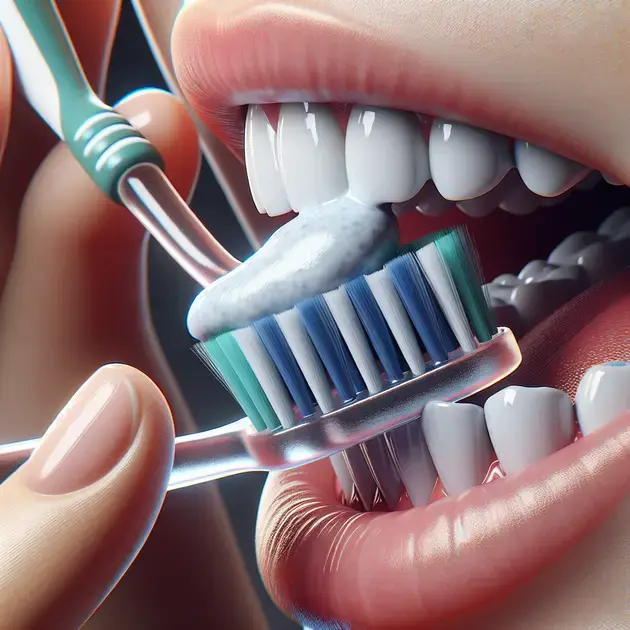Maintaining healthy gums and teeth is essential for overall oral health. With the right tips and techniques, you can ensure your mouth stays in optimal condition. Incorporating good oral hygiene practices into your daily routine can help prevent gum disease and other oral health issues.
One of the best ways to maintain healthy gums and teeth is to brush and floss regularly. Brushing at least twice a day and flossing once a day can help remove plaque and bacteria that can lead to gum disease. Additionally, using a fluoride toothpaste can strengthen your enamel and prevent cavities.

Essential Dental Care Tips for Healthy Gums and Teeth
Proper dental care is essential for maintaining healthy gums and teeth. Here are some tips to help you achieve optimal oral hygiene:
1. Brushing Technique:
Brush your teeth at least twice a day using a fluoride toothpaste. Use a soft-bristled toothbrush and brush in gentle, circular motions to remove plaque and food particles. Make sure to brush all surfaces of your teeth, including the back molars.
2. Floss Daily:
Make flossing a daily habit to clean between your teeth and along the gumline. Use about 18 inches of dental floss and gently slide it between each tooth, forming a C shape to hug the tooth and remove debris.
3. Use Mouthwash:
Rinse with an antiseptic mouthwash to help reduce plaque, prevent gum disease, and freshen breath. Look for a mouthwash that contains fluoride for added protection against cavities.
4. Visit Your Dentist Regularly:
Don’t skip your dental check-ups. Regular visits to your dentist for cleanings and exams are crucial for maintaining good oral health. Your dentist can detect any issues early and provide necessary treatments.
5. Maintain a Healthy Diet:
Eat a balanced diet rich in fruits, vegetables, and lean proteins. Limit sugary and acidic foods and beverages that can harm your teeth. Drink plenty of water to help wash away food particles and keep your mouth hydrated.
Effective Oral Hygiene Practices for Optimal Gum Health
To ensure optimal gum health, incorporate these effective oral hygiene practices into your daily routine:
1. Gentle Gum Massage:
Gently massage your gums with a soft toothbrush or clean fingers to improve blood circulation and promote gum health. Use a gentle, circular motion to avoid irritating the gums.
2. Avoid Tobacco Products:
Smoking and using tobacco products increase the risk of gum disease and oral cancer. Quitting smoking can significantly improve your gum health and overall well-being.
3. Use a Water Flosser:
Consider using a water flosser as an alternative to traditional flossing. A water flosser can help clean between teeth and along the gumline, reducing the risk of gum disease.
4. Maintain Good Posture:
Believe it or not, good posture can impact your oral health. Proper posture while sitting and standing can help prevent jaw pain and tension that may contribute to gum issues.
5. Stress Management:
Chronic stress can affect your oral health. Practice stress-reducing techniques such as meditation, yoga, or deep breathing exercises to promote overall wellness, including gum health.
The Importance of Regular Brushing and Flossing for Strong Teeth and Gums
Brushing and flossing regularly play a crucial role in maintaining strong teeth and healthy gums. Here’s why these habits are essential:
1. Plaque Removal:
Brushing and flossing help remove plaque, a sticky film of bacteria that can lead to gum disease and tooth decay. By removing plaque regularly, you can prevent oral health issues.
2. Preventing Bad Breath:
Poor oral hygiene can result in bad breath. Brushing your teeth and flossing help eliminate odor-causing bacteria, keeping your breath fresh and your mouth healthy.
3. Strengthening Tooth Enamel:
Brushing with fluoride toothpaste helps strengthen tooth enamel, the protective outer layer of your teeth. Flossing also contributes to keeping your teeth strong by removing debris that can weaken enamel.
4. Gum Disease Prevention:
Regular brushing and flossing can help prevent gum disease by removing bacteria and food particles that can irritate the gums. Healthy gums are essential for maintaining strong teeth and overall oral health.
5. Overall Wellness:
Good oral hygiene is linked to overall wellness. By maintaining a routine of brushing and flossing, you not only promote strong teeth and gums but also support your body’s overall health and well-being.

Essential Dental Care Tips for Healthy Gums and Teeth
Proper dental care is essential for maintaining healthy gums and teeth. Regular brushing and flossing are crucial habits that can prevent gum disease and tooth decay. In addition to daily oral hygiene practices, it is important to visit your dentist for routine check-ups and cleanings. These preventive measures can help detect any issues early on and ensure your gums and teeth stay healthy for years to come.
One of the key aspects of dental care is using the right products. Choose a toothbrush with soft bristles and replace it every three months. When selecting toothpaste, look for one that contains fluoride to help protect against cavities. Flossing is equally important, as it removes plaque and food particles between the teeth that brushing alone cannot reach.
Another essential tip for healthy gums and teeth is to maintain a balanced diet. Avoid sugary and acidic foods as they can contribute to tooth decay. Instead, opt for nutrient-rich foods like fruits, vegetables, and dairy products that promote strong teeth and gums. Drinking water throughout the day also helps wash away bacteria and debris that can lead to oral health issues.
Regular dental check-ups are crucial for identifying any potential problems early on. Your dentist can perform a thorough examination of your gums and teeth, looking for signs of gum disease, cavities, or other issues. By addressing these concerns promptly, you can prevent further damage and maintain optimal oral health.
In conclusion, following these essential dental care tips, such as regular brushing and flossing, using the right products, maintaining a balanced diet, and scheduling routine dental check-ups, can help ensure healthy gums and teeth for a lifetime.
Effective Oral Hygiene Practices for Optimal Gum Health
Healthy gums are a crucial component of good oral hygiene. To maintain optimal gum health, it is important to follow effective oral hygiene practices. Brushing your teeth twice a day with a fluoride toothpaste helps remove plaque and bacteria that can lead to gum disease. Use gentle, circular motions to clean all surfaces of your teeth and gums thoroughly.
In addition to brushing, flossing at least once a day is essential for removing plaque and food particles from between the teeth. This helps prevent gum inflammation and reduces the risk of gum disease. Consider using a water flosser for a more thorough clean, especially if you have braces or other dental appliances.
Another key aspect of optimal gum health is using an antimicrobial mouthwash. This can help reduce the level of bacteria in your mouth, promoting healthier gums. Be sure to follow the instructions on the mouthwash bottle for the best results. Additionally, chewing sugar-free gum after meals can help stimulate saliva production, which aids in cleaning the mouth and neutralizing acids.
Regular dental cleanings and check-ups are essential for maintaining optimal gum health. Your dentist can remove any plaque or tartar buildup that regular brushing and flossing may have missed. They can also identify early signs of gum disease and provide treatment to prevent further progression. By staying proactive with your oral hygiene practices and dental visits, you can ensure healthy gums for a lifetime.
By incorporating these effective oral hygiene practices into your daily routine, you can promote optimal gum health and prevent gum disease. Remember to brush and floss regularly, use antimicrobial mouthwash, chew sugar-free gum, and schedule regular dental check-ups for the best outcomes.
The Impact of Healthy Nutrition on Gum and Teeth Health
Healthy nutrition plays a significant role in maintaining strong and healthy gums and teeth. A balanced diet that includes essential nutrients like calcium, vitamin C, and phosphorus is critical for oral health. These nutrients help strengthen the teeth, promote healthy gums, and prevent issues like cavities and gum disease.
Foods rich in calcium, such as dairy products, leafy greens, and almonds, help build strong teeth and bones. Vitamin C, found in citrus fruits, strawberries, and bell peppers, is essential for collagen production, which helps support the gums and connective tissues in the mouth. Phosphorus, found in fish, lean meat, and nuts, contributes to healthy tooth enamel and bone structure.
Avoiding sugary and acidic foods is also vital for maintaining optimal gum and teeth health. These foods can erode tooth enamel, leading to cavities, and cause inflammation in the gums. Instead, opt for crunchy fruits and vegetables like apples and carrots, which can help clean the teeth and stimulate saliva production, promoting a healthier mouth.
Incorporating a variety of nutrient-rich foods into your diet, along with drinking plenty of water, can have a positive impact on your gum and teeth health. Water helps rinse away food particles and bacteria, reducing the risk of cavities and gum disease. By making healthy food choices and staying hydrated, you can support the overall health of your mouth and maintain a beautiful smile.
In conclusion, the impact of healthy nutrition on gum and teeth health cannot be overstated. By consuming a balanced diet rich in essential nutrients and avoiding sugary, acidic foods, you can promote strong teeth, healthy gums, and overall oral health.
Conclusion
Proper dental care is crucial for maintaining healthy gums and teeth. Regular brushing, flossing, and routine dental check-ups are essential practices to prevent gum disease and tooth decay. Using the right products, such as a toothbrush with soft bristles and fluoride toothpaste, can further protect against cavities. Maintaining a balanced diet rich in nutrient-dense foods and avoiding sugary, acidic items is key to promoting strong teeth and gums.
To ensure optimal gum health, effective oral hygiene practices like brushing with fluoride toothpaste, daily flossing, and using antimicrobial mouthwash are recommended. Regular dental cleanings and check-ups help in identifying early signs of gum disease and maintaining gum health. Chewing sugar-free gum and staying hydrated by drinking water throughout the day can also aid in oral hygiene.
Healthy nutrition plays a significant role in supporting gum and teeth health. Consuming foods rich in calcium, vitamin C, and phosphorus strengthens teeth, promotes healthy gums, and prevents cavities and gum disease. Avoiding sugary, acidic foods that erode tooth enamel is crucial. By incorporating nutrient-rich foods into your diet and maintaining good oral hygiene habits, you can promote overall oral health and ensure strong teeth and healthy gums for a lifetime.